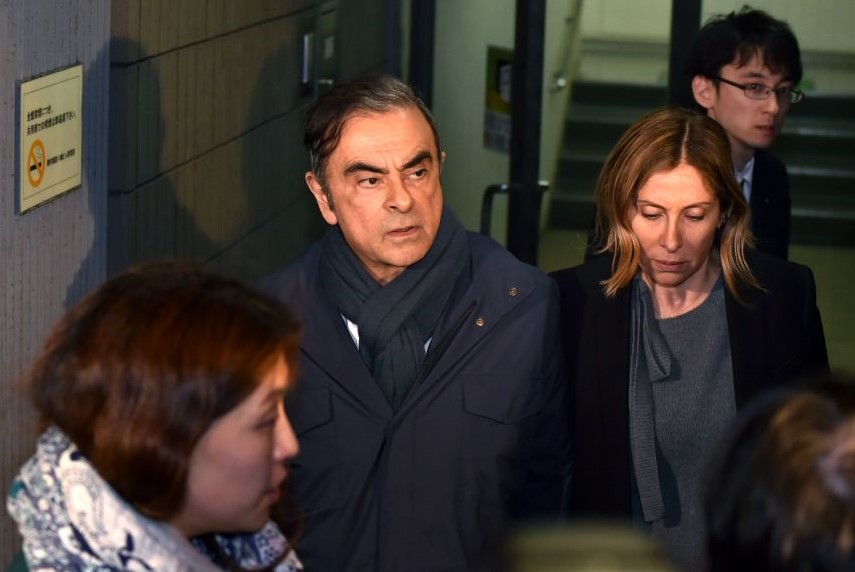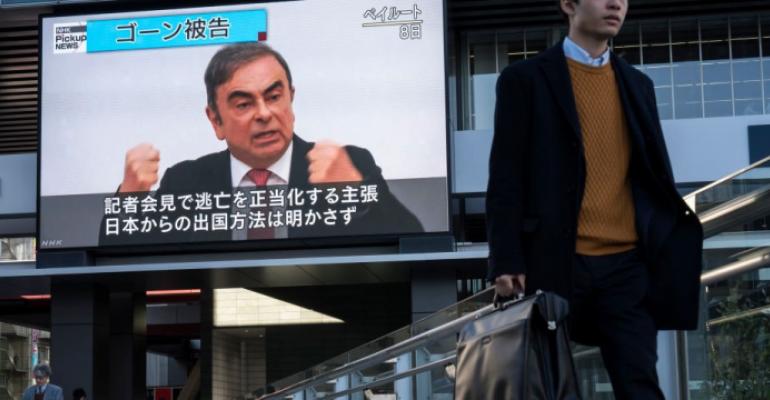Second installment of a three-part series.
Carlos Ghosn, the ousted former head of the Renault-Nissan-Mitsubishi Alliance and today an international fugitive, pulls no punches in a late-May interview with Wards.
The French-Brazilian-Lebanese executive has been living in exile in his native Lebanon since fleeing Japan on New Year’s Eve 2019. He had been jailed in Japan on a complex web of charges, primarily conspiring to falsify official financial reports regarding his reported ¥9.3 billion ($85 million) retirement compensation package from Nissan.
Ghosn has volunteered to meet with French prosecutors in Lebanon, which has no extradition treaty with Japan. He also has offered to meet with Japanese prosecutors but is not willing to return to Japan because he believes he can’t get a fair trial there.
Japanese authorities held him in solitary confinement for 130 days and subjected him to extended interrogations most of those days, without a lawyer present.
The charges of conspiracy to falsify documents currently are being adjudicated in the trial of American Greg Kelly, a Ghosn ally on Nissan’s board who was arrested with Ghosn on Nov. 19, 2018. Ghosn was voted off both Nissan’s and Mitsubishi’s board, where he sat as chairman, shortly after his arrest.
Nissan, Renault and Mitsubishi – the three Alliance partners – as well as the Japanese Justice Ministry all declined Wards’ requests for interviews.
The following are edited excerpts from Wards’ interview with Ghosn.
Wards: Could you explain the issue of your taking a 50% pay cut in 2010 because of the change in Japan’s financial disclosure law regarding executive compensation? There’s a great deal of confusion... Kelly’s defense team in his trial reportedly played a video from when you were incarcerated, discussing that you took the 50% cut in pay because you felt you had to do it for morale in the company.
Ghosn: In 2010 (Nissan) wasn’t in great shape. This was after the financial crisis, and I thought that having a big salary, frankly, would have been reasonable in the U.S., Germany or China but would be difficult for the Japanese public to understand.
At the time, I needed everybody to be motivated and aligned on the recovery of Nissan. So, I decided voluntarily and without pressure to reduce my compensation…which was below the compensation of other CEOs in the industry (particularly in North America). And I maintained it because in 2011, if you remember, we had the earthquake, which further damaged the Japanese economy. And Nissan of course was struggling.
You know that in 2009 Steve Rattner (head of the Obama Admin.’s automotive task force) proposed to me to become the CEO of General Motors. Greg Kelly expressed concern that I might leave (Nissan) and take an offer from another car maker since my decision to take the salary cut was for management reasons.
That's how they started to think about ways in which Nissan could keep me. And the only legal way to do it was to prepare a package for after my retirement that would be attractive enough for me to stay. That's it.
Wards: So, the idea was not (for you) to have shareholder equity rights. It was actually to have some sort of future work that you would do for the company.
Ghosn: Exactly. Obviously, there'd been a lot of brainstorming on this. And between the two representative directors, Greg Kelly and (Ghosn’s future Nissan co-CEO Hiroto) Saikawa, they agreed on the proposal – both of them signed it – for a package for after (my) retirement. This document was not executional because to be executional, it had to have my signature, number one. And second, it had to go to the board because the two representative directors could not make a decision on behalf of the board.
Wards: So, no decision was ever made?
Ghosn: Exactly. There was a proposal for after retirement that was not decided and not defined and should have gone to the board after my retirement. It would have been proposed by Nissan directors who would say, “Look, we discussed it with Carlos Ghosn. It is one way to keep him totally tied to the company so we can use his services for the long term and avoid his working for another organization.”
Wards: Speaking of Greg Kelly, who is currently on trial in Japan...
Ghosn: The only charge is complicity in the non-declaration of compensation that was neither decided nor paid. Frankly, I don't understand what he can be guilty of because nothing was decided. It didn't go to the board. And so long as it wasn't decided, he didn't have to inform the shareholders about something that he was not sure that I would formally agree to.
Wards: His lawyers, based on the reporting I’ve seen, have completely destroyed key parts of the prosecution’s case. But it doesn't seem to matter.

Under arrest, Carlos Ghosn with wife Carole in Japan, April 2019.
Ghosn: You’re in Japan. You can destroy anything you want. But in the end the score is 99.4% conviction. The judges are just a kind of an appendage of the prosecutor. And they certainly don't want a foreigner who is pleading innocent to be (found) innocent. This would be the end of a long tradition.
I have no doubt that Kelly is innocent. He should be free. I hope some big miracle would lead the judges to this decision.
Wards: Do you consider the decision to oust you, which was followed by a more than $8 billion loss in market capitalization at Nissan, to be the biggest financial scandal in Japan’s history?
Ghosn: Oh yeah. The loss (by) the alliance is enormous. The responsibility of this group of people inside Nissan (who engineered the coup), the prosecutor of Tokyo and the government of Japan for the demise of Nissan is huge. And it is not only Nissan. Look at Mitsubishi. Mitsubishi was in the middle of a recovery in 2017 and 2018. Look what happened to them in 2020. And then look at what happened to Renault.
And you know what they said? “COVID.” They think people are stupid and that COVID didn’t touch Toyota, Volkswagen or even PSA…Not a single person had the courage to say, “Look, if we want to fix this problem, we need to look it in the eye to get a clear diagnosis about the future.”
They're still hiding behind COVID and Carlos Ghosn’s expansionist strategy. Those are their two rationalizations. Well, if they maintain that diagnosis, there is no reason to think they're going to recover.





